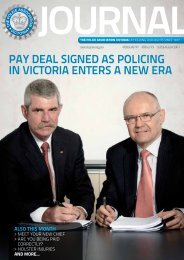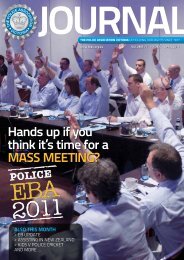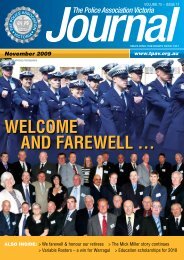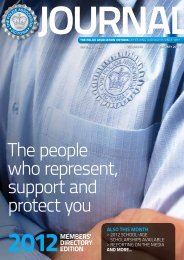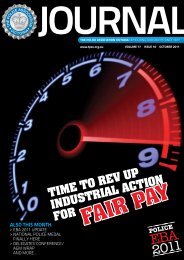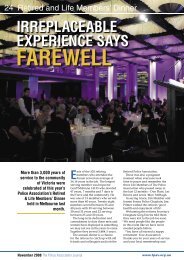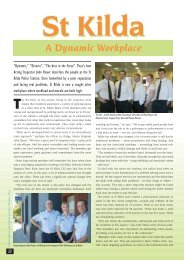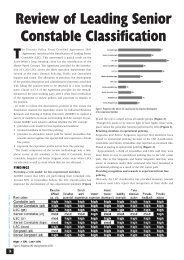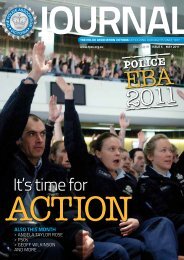DECISION - The Police Association Victoria
DECISION - The Police Association Victoria
DECISION - The Police Association Victoria
You also want an ePaper? Increase the reach of your titles
YUMPU automatically turns print PDFs into web optimized ePapers that Google loves.
[2011] FWA 7357<br />
<strong>DECISION</strong><br />
Fair Work Act 2009<br />
s.238—Application for a scope order<br />
Detective Superintendent Neil Paterson<br />
v<br />
<strong>Police</strong> Federation of Australia; <strong>Victoria</strong> <strong>Police</strong>; Mr Richard Bowers<br />
(B2011/1420)<br />
State and Territory government administration<br />
COMMISSIONER SMITH MELBOURNE, 27 OCTOBER 2011<br />
Concerning bargaining unit for the proposed collective agreement.<br />
INTRODUCTION<br />
[1] By application dated 21 June 2011, Detective Superintendent Neil Paterson of the<br />
<strong>Victoria</strong> <strong>Police</strong> sought, pursuant to s.238 of the Fair Work Act 2009 (Cth) (the Act), the<br />
making of a scope order. Detective Superintendent Paterson has, pursuant to s.176 of the Act,<br />
been appointed as a bargaining representative for 51 of the 81 Superintendents (including<br />
himself). Senior Sergeant Bowers has also been appointed a bargaining representative for the<br />
<strong>Police</strong> Prosecutors. <strong>The</strong> <strong>Police</strong> Federation of Australia (PFA) is the bargaining representative<br />
for all other members of <strong>Victoria</strong> <strong>Police</strong> up to and including the rank of Commander.<br />
[2] In the proceedings, Detective Superintendent Paterson was represented by<br />
Mr R. Millar of Counsel. <strong>The</strong> PFA was represented by Mr W. Friend SC and <strong>Victoria</strong> <strong>Police</strong><br />
was represented by Mr B. Mueller of Counsel. Senior Sergeant Bowers was notified by the<br />
applicant of the proceedings but did not enter an appearance.<br />
[3] Detective Superintendent Paterson seeks the making of an order for a proposed<br />
agreement with <strong>Victoria</strong> <strong>Police</strong> to cover Superintendents, Chief Superintendents and<br />
Commanders.<br />
[4] <strong>The</strong>re is no application by any other person other than those represented by Detective<br />
Superintendent Paterson and the application is opposed by <strong>Victoria</strong> <strong>Police</strong> and the PFA.<br />
THE LEGISLATION<br />
[5] <strong>The</strong> relevant section of the Act is s.238 which provides:<br />
“238 Scope orders<br />
1
[2011] FWA 7357<br />
Bargaining representatives may apply for scope orders<br />
(1) A bargaining representative for a proposed single-enterprise<br />
agreement may apply to FWA for an order (a scope order) under this<br />
section if:<br />
(a)<br />
(b)<br />
the bargaining representative has concerns that bargaining for<br />
the agreement is not proceeding efficiently or fairly; and<br />
the reason for this is that the bargaining representative<br />
considers that the agreement will not cover appropriate<br />
employees, or will cover employees that it is not appropriate for<br />
the agreement to cover.<br />
No scope order if a single interest employer authorisation is in operation.<br />
(2) Despite subsection (1), the bargaining representative must not apply<br />
for the scope order if a single interest employer authorisation is in<br />
operation in relation to the agreement.<br />
Bargaining representative must have given notice of concerns.<br />
(3) <strong>The</strong> bargaining representative may only apply for the scope order if the<br />
bargaining representative:<br />
(a)<br />
(b)<br />
(c)<br />
has given a written notice setting out the concerns referred to in<br />
subsection (1) to the relevant bargaining representatives for the<br />
agreement; and<br />
has given the relevant bargaining representatives a reasonable<br />
time within which to respond to those concerns; and<br />
considers that the relevant bargaining representatives have not<br />
responded appropriately.<br />
When FWA may make scope order<br />
(4) FWA may make the scope order if FWA is satisfied:<br />
(a)<br />
(b)<br />
(c)<br />
that the bargaining representative who made the application<br />
has met, or is meeting, the good faith bargaining requirements;<br />
and<br />
that making the order will promote the fair and efficient<br />
conduct of bargaining; and<br />
that the group of employees who will be covered by the<br />
agreement proposed to be specified in the scope order was<br />
fairly chosen; and<br />
2
[2011] FWA 7357<br />
(d)<br />
it is reasonable in all the circumstances to make the order.<br />
Matters which FWA must take into account<br />
(4A)<br />
If the agreement proposed to be specified in the scope order will not<br />
cover all of the employees of the employer or employers covered by the<br />
agreement, FWA must, in deciding for the purposes of paragraph (4)(c)<br />
whether the group of employees who will be covered was fairly chosen,<br />
take into account whether the group is geographically, operationally or<br />
organisationally distinct.<br />
Scope order must specify employer and employees to be covered<br />
(5) <strong>The</strong> scope order must specify, in relation to a proposed singleenterprise<br />
agreement:<br />
(a)<br />
(b)<br />
the employer, or employers, that will be covered by the<br />
agreement; and<br />
the employees who will be covered by the agreement.<br />
Scope order must be in accordance with this section etc.<br />
(6) <strong>The</strong> scope order:<br />
(a)<br />
(b)<br />
must be in accordance with this section; and<br />
may relate to more than one proposed single-enterprise<br />
agreement.<br />
Orders etc. that FWA may make<br />
(7) If FWA makes the scope order, FWA may also:<br />
(a)<br />
(b)<br />
amend any existing bargaining orders; and<br />
make or vary such other orders (such as protected action ballot<br />
orders), determinations or other instruments made by FWA, or<br />
take such other actions, as FWA considers appropriate.<br />
239 Operation of a scope order<br />
A scope order in relation to a proposed single-enterprise agreement:<br />
(a)<br />
(b)<br />
comes into operation on the day on which it is made; and<br />
ceases to be in operation at the earliest of the following:<br />
3
[2011] FWA 7357<br />
(i)<br />
(ii)<br />
(iii)<br />
(iv)<br />
if the order is revoked—the time specified in the instrument of<br />
revocation;<br />
when the agreement is approved by FWA;<br />
when a workplace determination that covers the employees that<br />
would have been covered by the agreement comes into<br />
operation;<br />
when the bargaining representatives for the agreement agree<br />
that bargaining has ceased.”<br />
THE SUBMISSIONS AND EVIDENCE<br />
[6] To begin, there is no issue that Detective Superintendent Paterson can make the<br />
application [s.238(1)]; a single interest employer authorisation is not in operation [s.238(2)]<br />
and that good faith negotiations have taken place [s.238(4)(a)].<br />
[7] It is the other preconditions over which there is disagreement between the parties.<br />
[8] Detective Superintendent Paterson argues that:<br />
<strong>The</strong> bargaining has not been efficient or fair. In this connection two matters were<br />
raised to support this concern. <strong>The</strong>y were the pace of the negotiating process and<br />
the fact that government policy was constraining those negotiations.<br />
In addition, many of the matters being discussed in the broader negotiation were of<br />
no relevance to the Superintendents.<br />
Separate negotiations will concentrate on the concerns of Superintendents’ and in<br />
particular the wage disparities for Superintendents’ compared to other jurisdictions.<br />
Separate negotiations would permit <strong>Victoria</strong> <strong>Police</strong> to negotiate with ranks below<br />
Superintendent.<br />
<strong>The</strong>re is an inherent unfairness in Superintendents being included in an agreement<br />
they don’t want and then being overwhelmed in a vote by a majority of employees<br />
whose interests are different.<br />
Superintendents are a distinct operational group given the rank structure within<br />
<strong>Victoria</strong> <strong>Police</strong> and the managerial responsibilities of Superintendents, Chief<br />
Superintendents and Commanders.<br />
Previously, Commanders have been regulated separately and, given that the<br />
Commander rank is being phased out, a separate agreement with Superintendents<br />
and Commanders is appropriate. Further, the duties of Commanders will be<br />
devolved to Superintendents.<br />
[9] In particular, Detective Superintendent Paterson relies upon the finding of the<br />
Full Bench in the United Firefighters’ Union of Australia v Metropolitan Fire & Emergency<br />
Services Board [[2010] FWAFB 3009] (the Firefighters Case) in relation to senior managerial<br />
roles.<br />
4
[2011] FWA 7357<br />
[10] In support of the application, evidence was called from: Superintendent Paterson<br />
(Divisional Commander, State Intelligence Division), Superintendent P. Bull (Chief of Staff<br />
the Assistant Commissioner, North West Metro Region), Superintendent A. Allen (Divisional<br />
Commander, Division 3, Western Region); Superintendent J. Forti (Divisional Commander,<br />
Division 2, East Region); Superintendent J. Tudor (Officer in Charge, Specialist Response<br />
Division).<br />
[11] <strong>The</strong> evidence of these persons covered their role, duties and responsibilities. <strong>The</strong>re can<br />
be little doubt that persons holding the rank of Superintendent have responsible and<br />
demanding roles.<br />
[12] <strong>The</strong> PFA argue that the application does not meet the jurisdictional prerequisites of<br />
s.238 of the Act. Specifically, the requirement contained in s.238(1)(a) that the bargaining<br />
representative has “concerns” that bargaining for the agreement is not proceeding efficiently<br />
or fairly must be reasonably held 1 and on the facts, as it sees them, those concerns are not<br />
reasonably held.<br />
[13] It argued that the evidence would demonstrate that the process of negotiation was<br />
inherently fair and relatively efficient. It was submitted that the notice given did not identify<br />
the relevant facts to support the application.<br />
[14] As to the merits, the PFA accept that the good faith bargaining requirements have been<br />
met. It does not accept that the making of the order would promote fair and efficient<br />
bargaining as the only criticism of the bargaining process was the fact of the negotiating<br />
constraints imposed upon <strong>Victoria</strong> <strong>Police</strong> by the Government wages policy. It was argued that<br />
the granting of the scope order would make the process less efficient because elements of the<br />
agreement would need to be repeated. Further, the PFA will be involved in two sets of<br />
meetings as it continues to also represent Superintendents. In this connection the same<br />
bargaining teams will meet and consider identical interests.<br />
[15] It was submitted that the present bargaining arrangements where the Superintendents<br />
are considered first so that Detective Superintendent Paterson can attend and then leave, was a<br />
more efficient way of bargaining.<br />
[16] Going directly to the matters raised by Detective Superintendent Paterson, <strong>The</strong> PFA<br />
addressed the arguments that Superintendents are: a discrete group; given the managerial<br />
responsibilities would have a conflict of interest between their interests and those of other<br />
police officers; that they are distinguished from other ranks because of the limited appeal<br />
rights and that Superintendents have really taken over the role of Commanders. Its reply was<br />
that Superintendents form a part of a disciplined force who enter as recruits and progress<br />
through the ranks. <strong>The</strong>y are firmly entrenched within the police structure given that they are<br />
sworn and are a part of the operational police force. As to the argument in relation to conflict<br />
of interest, the same could be said of any level of authority within the rank structure and there<br />
is no reason to draw the line under Superintendents.<br />
[17] Finally, it was argued that Superintendents have not taken over the role of<br />
Commanders rather, that role has been subsumed into the role of Assistant Commissioner.<br />
1 R v Connell; exparte Hetton Bellbird Collieries Ltd (1944) 69 CLR 407 at 430.<br />
5
[2011] FWA 7357<br />
[18] <strong>The</strong> PFA submitted that there was a very real possibility that if Superintendents<br />
achieved a separate agreement then it would drive a wedge between them and other members<br />
of the <strong>Police</strong> Force to the detriment of the culture of the Force which is perceived as having a<br />
community of interests between serving officers.<br />
[19] Finally, it was submitted that even if a conclusion was reached that many aspects of<br />
s.238(4) were satisfied, the use of the word “may” in contradistinction to the use of the word<br />
“must” in other parts of the section, provided a general discretion.<br />
[20] <strong>The</strong> PFA called Mr Chris Kennedy, the Industrial Relations Manager, to give evidence<br />
on the structure of <strong>Victoria</strong> <strong>Police</strong>, the history of the Superintendent and Commander Rank<br />
and the industrial regulation of <strong>Victoria</strong> <strong>Police</strong>. I shall return to this aspect later as it forms the<br />
relevant backdrop for a consideration of this matter.<br />
[21] Mr Kennedy also provided evidence on the negotiations and the matters agreed and<br />
not agreed. Much of this cannot be recorded because of the confidentiality of the negotiations,<br />
but it is sufficient to observe that the frustration felt by the Superintendents in relation to the<br />
negotiating parameters set by Government was shared by the PFA.<br />
[22] <strong>The</strong> PFA also called Superintendent D. Newton (Superintendent Project Division in<br />
the Operational Support Department); Superintendent A. DeRidder (Workforce Support<br />
Superintendent in Region 3); Superintendent J. Hendrickson (Superintendent Divisional<br />
Commander of Number 2 Division, Westgate, North West Metro Region); Senior Sergeant<br />
J. Hauer (Senior Sergeant Chelsea <strong>Police</strong> Station); Inspector B. McKenzie (Inspector<br />
McKenzie is on unpaid leave and currently working as the Assistant Secretary of the PFA.<br />
A witness statement of Inspector Cheney was tendered but he was not called.<br />
[23] <strong>The</strong> evidence of the witnesses for the PFA dealt with:<br />
<strong>The</strong> attention given by the PFA to the concerns of Superintendents and Inspectors<br />
in their terms and conditions of employment,<br />
<strong>The</strong> achievements of the PFA to the benefit of Superintendents and Inspectors and<br />
the representation provided to those ranks by the PFA,<br />
<strong>The</strong> roles duties and responsibilities of Superintendents,<br />
<strong>The</strong> career nature of the rank structure within <strong>Victoria</strong> <strong>Police</strong> and that generally<br />
there is no lateral entry below the rank of Commander,<br />
<strong>The</strong> unrest amongst Superintendents who were not part of the application and who<br />
believed that to separate Superintendents would be bad for morale and disruption<br />
of the culture of a single police force where sworn members have a single identity,<br />
<strong>The</strong> unifying nature of having a single enterprise agreement covering all ranks, 2<br />
<strong>The</strong> times at which persons in authority have had to deal with disputes where the<br />
PFA would represent a junior officer. However this did not mean that the PFA<br />
could not represent all groups within the <strong>Police</strong> Force,<br />
2 This includes the desire to return Commanders to the single agreement.<br />
6
[2011] FWA 7357<br />
<strong>The</strong> fact that Senior Sergeants also have a responsible and supervisory role and that<br />
this did not lead to a conflict of interest, and<br />
<strong>The</strong> different roles of Superintendents vis a vis Commanders and Senior Sergeants.<br />
[24] <strong>Victoria</strong> <strong>Police</strong> also opposed the application. It was its submission that the granting of<br />
the application would make the bargaining process less efficient and would be a waste of<br />
resources. It maintained that it wished to retain the status quo in relation to the industrial<br />
agreements. Namely; one agreement for all sworn officers up to and including the rank of<br />
Chief Superintendent and one agreement which covers employees engaged at the rank of<br />
Commander.<br />
[25] <strong>Victoria</strong> <strong>Police</strong> outlined the steps it took to ensure that bargaining representatives,<br />
other than the PFA, were given proper consideration in the bargaining process. Arrangements<br />
were made to provide the relevant material to all the bargaining representatives and to<br />
schedule discussion at times when particular bargaining representatives could participate<br />
effectively. In relation to the applicant, it was decided that all matters relating to<br />
Superintendents would be dealt with at the beginning of all bargaining meetings. In addition,<br />
and in passing, the same arrangements were made for the other bargaining representative,<br />
Sergeant Bowers. 3<br />
[26] It was the submission of <strong>Victoria</strong> <strong>Police</strong> that there had been more than 56 bargaining<br />
meetings where the PFA had attended all of them and Superintendent Paterson had only<br />
attended about half. It submitted that there would be no change in the bargaining process if<br />
the Superintendents were successful in the scope order. <strong>The</strong> level of authority at the<br />
bargaining table would not change. It was submitted that a separate process for the<br />
Superintendents would only complicate and delay the bargaining process.<br />
[27] In relation to the argument put forward regarding the possible conflict of interest for<br />
Superintendents to be in the same bargaining unit as the balance of the police force (excluding<br />
Commanders), <strong>Victoria</strong> <strong>Police</strong> submit that no conflict exists.<br />
[28] <strong>Victoria</strong> <strong>Police</strong> submit that Detective Superintendent Paterson’s claims were limited to<br />
a few narrow issues, the most important being salary, vehicles, rental assistance and office<br />
space. In all other respects the Superintendents represented by Superintendent Paterson would<br />
rely upon other matters sought and considered by the PFA. <strong>Victoria</strong> <strong>Police</strong> advised that the<br />
PFA represented approximately one third of the Superintendents so that there would be<br />
considerable overlap in negotiations if the groups were separated.<br />
[29] <strong>Victoria</strong> <strong>Police</strong> called Ms Liz Cheligoy, the Director of Workplace Relations, to give<br />
evidence on the existing industrial instruments and the structure of the negotiations.<br />
In particular evidence was given that the claims made by the Superintendents sought to<br />
“piggy back off” the claims filed by the PFA with respect to the terms and conditions of<br />
employment which were common to all ranks.<br />
[30] It was the evidence of Ms Cheligoy that it was appropriate for Superintendents to be<br />
covered by an agreement applying to sworn officers up to and including that rank because:<br />
3 Sergeant Bowers had previously made an application in relation to good faith bargaining see [2011] FWA 5789.<br />
7
[2011] FWA 7357<br />
<strong>The</strong>y had been covered by the one agreement since 2001 and it has not led to any<br />
significant conflict of interest<br />
<strong>The</strong> phasing out of the Commander rank would mean that the majority of their<br />
duties would be reallocated to Assistant Commissioners. Some Assistant<br />
Commissioner duties would be reallocated to Superintendents and, in turn, some<br />
Superintendent duties would be reallocated to Inspectors.<br />
It was not unusual for managers to be union members and covered by the same<br />
enterprise agreement and Superintendents do not have the authority to determine<br />
terms and conditions of employment for their subordinates as they are required to<br />
exercise their managerial responsibility in accordance with internal policies and<br />
procedures underpinned by the enterprise agreement.<br />
Superintendents are not the only sworn officers who have managerial functions<br />
within <strong>Victoria</strong> <strong>Police</strong>.<br />
To the extent that any differences exist for Superintendents then they can easily be<br />
set out in the agreement under a separate clause.<br />
HISTORICAL AND EXISTING INDUSTRIAL COVERAGE<br />
[31] From 1975 until 1991 salaries and conditions of employment for <strong>Victoria</strong> <strong>Police</strong> up to<br />
and including the rank of Commander were regulated by the <strong>Police</strong> Service Board. Prior to<br />
1975 the Board’s jurisdiction did not extend to Chief Superintendent. In 1992 the jurisdiction<br />
was transferred to the Industrial Relations Commission of <strong>Victoria</strong>. Again, coverage was up to<br />
an including the rank of Commander. As an aside, the Commander rank was only introduced<br />
in 1972 whereas the rank of Superintendent has existed for almost as long as <strong>Victoria</strong> <strong>Police</strong>.<br />
[32] In May 1995 the Employee Relations Commission of <strong>Victoria</strong> made a minimum wage<br />
order covering all ranks from Constable up to and including Commander. Also in 1995 the<br />
<strong>Police</strong> <strong>Association</strong> and the Chief Commissioner of <strong>Police</strong> reached an enterprise agreement<br />
which covered all ranks up to and including the rank of Commander.<br />
[33] <strong>The</strong> Commonwealth Powers Industrial Relations Act 1996 (Vic) referred certain<br />
powers to the Commonwealth for conciliation and arbitration of industrial disputes within<br />
<strong>Victoria</strong>. <strong>The</strong> effect was that for police officers below the rank of Assistant Commissioner the<br />
terms and conditions of employment could be regulated through the federal industrial<br />
relations system. In 1998 the Australian Industrial Relations Commission made a <strong>Police</strong><br />
Services Industry Sector Order—<strong>Victoria</strong> 1998 which included rates of pay for police ranks<br />
up to an including Commander.<br />
[34] During 1998, the then State Government sought individual employment contracts with<br />
Commanders. Commanders entered into these contracts. Also in 1998 the <strong>Police</strong> <strong>Association</strong><br />
entered into an enterprise agreement with <strong>Victoria</strong> <strong>Police</strong> which covered all ranks up to and<br />
including Chief Superintendent. In 1998 and 1999 <strong>Victoria</strong> <strong>Police</strong> sought to introduce<br />
individual contracts for Superintendents and Inspectors. At that time individual contracts were<br />
not agreed but the <strong>Police</strong> <strong>Association</strong> and <strong>Victoria</strong> <strong>Police</strong> negotiated a separate enterprise<br />
agreement.<br />
8
[2011] FWA 7357<br />
[35] In 2001 the <strong>Police</strong> <strong>Association</strong> sought to return to a single agreement covering all<br />
ranks up to and including Commanders. Agreement was reached on an enterprise agreement<br />
which excluded Commanders and covered all ranks up to and including Chief Superintendent.<br />
In 2007 two new agreements were reached—one covering all ranks up to and including Chief<br />
Superintendent and the other covering Commanders.<br />
[36] At the time of reserving the decision negotiations were in progress where the PFA was<br />
seeking again to cover all ranks up to an including Commanders.<br />
COMMANDERS<br />
[37] It is appropriate to record that all parties submitted that the rank of Commander was<br />
being phased out. <strong>Victoria</strong> <strong>Police</strong> expressed the view that the duties roles and responsibilities<br />
would be absorbed within the Assistant Commissioner rank with some of the lesser duties of<br />
the Assistant Commissioner being devolved to Superintendents. It was clear that this was not<br />
to diminish the importance of the role of Superintendents but to make clear the limited impact<br />
upon their work resulting from the loss of the Commander rank over time.<br />
[38] It also needs to be observed that at the opening of the proceedings I asked if I needed<br />
to hear from the Commanders and Chief Superintendents as they have not been separately<br />
notified of the hearing. Whilst I expressed some apprehension about their ability to make<br />
submissions upon an application which sought to join them in a bargaining unit with other<br />
ranks, my concern was overcome when it was clear that the PFA represented Commanders.<br />
<strong>The</strong>refore the matter proceeded without separately advising the Commanders and Chief<br />
Superintendents.<br />
CONSIDERATION OF THE ISSUES<br />
[39] I turn firstly to consider the concerns of Detective Superintendent Paterson. Whilst it<br />
was the primary argument that it was purely a subjective test, it was submitted that it would<br />
not matter if the test of reasonableness was applied to that subjective judgement. I favour the<br />
latter course because it would be difficult to accept that the jurisdiction could be enlivened by<br />
unreasonable concerns. In any event, given the submission of Mr Millar nothing turns on it.<br />
[40] <strong>The</strong>refore it is appropriate to examine those concerns. <strong>The</strong>y relate to:<br />
the approach by the Government of <strong>Victoria</strong> in constraining negotiators to<br />
outcomes consistent with Government Policy,<br />
the salary relativities of Superintendents in <strong>Victoria</strong> compared with those for<br />
Superintendents in other jurisdictions,<br />
some other matters where Superintendents wish to be especially considered in<br />
negotiations.<br />
[41] Whilst I understand the concern held by Detective Superintendent Paterson about the<br />
approach taken to public sector bargaining, it is in my experience, common. It would not<br />
make any difference if there was a single bargaining unit or several bargaining units the<br />
approach would remain the same. It follows that the approach of the <strong>Victoria</strong>n Government<br />
9
[2011] FWA 7357<br />
should not be a concern which could be distinguished depending upon the number of the<br />
bargaining units within <strong>Victoria</strong> <strong>Police</strong>.<br />
[42] <strong>The</strong> salary issue is a real issue and has relevance to the structure of bargaining units.<br />
Separate bargaining units may have an opportunity to disturb relativities, although this is not<br />
an easy task. History would teach us that the disturbance of relativities is best achieved when<br />
all interested parties are involved.<br />
[43] Finally, I now turn to the other matters referred to earlier in this decision. It is apparent<br />
from the history of regulation and bargaining, that separate provisions have been made for<br />
Superintendents in enterprise agreements, although I accept that separate bargaining may<br />
allow for a greater focus to be placed on the interests of Superintendents. I find, on balance,<br />
that the jurisdictional prerequisite contained in s.238(1) is met. I further find that s.238(2) has<br />
no application and that the applicant has met the provisions of s.238(3) of the Act.<br />
[44] It is therefore appropriate to turn to the provisions of s.238(4). To begin, I am satisfied<br />
that the Detective Superintendent has met the good faith bargaining requirements consistent<br />
with s.238(4)(a).<br />
[45] <strong>The</strong> next matter is whether or not the making of a scope order would promote the fair<br />
and efficient conduct of bargaining. To reach satisfaction on this point it would be necessary<br />
to conclude that that the current approach is somewhat deficient in this regard. As the<br />
Full Bench said in the Firefighters Case: “<strong>The</strong> implication is that the tribunal should be<br />
satisfied that if an order is made the bargaining will at least be fairer or more efficient or<br />
both than it would if no order was made.” 4<br />
[46] <strong>The</strong>re are two aspects to this consideration. <strong>The</strong> first is, would it be more efficient and<br />
the second, would it be fairer. As to whether it would be more efficient I have formed the<br />
view that it would not. <strong>The</strong> approach adopted by the parties to the structure of negotiations<br />
has given emphasis to the two bargaining representatives apart from the PFA. Care has been<br />
taken (with perhaps one oversight) to ensure that both Detective Superintendant Paterson and<br />
Sergeant Bowers were provided with information and the opportunity to attend at times when<br />
specific discussion would take place on the issues of importance to them. Whilst both<br />
bargaining representatives were constrained by their obligations to their job, the PFA and<br />
<strong>Victoria</strong> <strong>Police</strong> were able to devote full-time capacity to the negotiations. Nevertheless<br />
particular arrangements were made. I add that it appears to me that separate bargaining units<br />
would not have overcome this problem of meeting times. I am also not persuaded that<br />
separate bargaining units would be more efficient in the context of the significant number of<br />
common matters which apply to all ranks.<br />
[47] As to the question of fairness, I am not satisfied that it would be fairer if there was a<br />
separate bargaining unit for Superintendents even though they would be joined with<br />
Commanders. <strong>The</strong> main reason for this proposition by the Superintendents is that they would<br />
be put into a minority and outvoted, thus leaving them powerless to achieve any real<br />
objectives. To begin, it is not unusual for particular self interests to be the subject of<br />
consideration in a bargaining unit and bargainers often have to reach an accommodation<br />
4 United Firefighters’ Union of Australia v Metropolitan Fire & Emergency Services Board [2010] FWAFB 3009 at<br />
paragraph 55.<br />
10
[2011] FWA 7357<br />
between those self interested groups. In this connection there is no evidence that previous<br />
bargaining by the PFA, which included Superintendents, has failed to take account of views<br />
or objectives of Superintendents. Indeed representations have been made on their behalf in the<br />
past.<br />
[48] Whilst it is open to employees to name bargaining representatives (including<br />
themselves) it does not follow that simply because they do, then their interests need the<br />
formation of separate bargaining units.<br />
[49] <strong>The</strong> next issue relevant to both a consideration under s.238(4)(b) and (c) is the<br />
supervisor/supervised conflict which is said to exist. In this connection Detective<br />
Superintendent Paterson relied heavily on the decision in the Firefighters Case. In that case it<br />
was the employer who sought to separate the bargaining units against the will of the<br />
employees concerned. In that case it was submitted that a conflict existed between<br />
management and those they managed. <strong>The</strong> Bench observed: “Speaking generally there can be<br />
no doubt that such a conflict exists.” 5 In that case the Bench went on to outline the particular<br />
responsibilities which gave rise to that conclusion. <strong>The</strong> facts in this case, whilst similar, are<br />
not the same. For example, the role in disciplinary matters is different. I have had the benefit<br />
of evidence from many currently serving officers on this question, including a Senior<br />
Sergeant who also has significant supervisory responsibilities. I am sufficiently persuaded that<br />
there is a community of interest within the <strong>Victoria</strong> <strong>Police</strong> that the various conflicts which are<br />
said to exist do not impair the collective bargaining by the current bargaining unit.<br />
[50] Each case must be decided on its own facts and as Mr Mueller for <strong>Victoria</strong> <strong>Police</strong><br />
stated in relation to the Firefighters Case: “it’s a decision on its own facts; it’s not a statement<br />
of principle.” 6 In this case the history of industrial regulation is different and some of the<br />
responsibilities differ. Whilst there is a common rank structure in both cases, extensive<br />
evidence was given in this case about the identity of purpose found in sworn officers. This<br />
was not uniformly agreed but it was sufficient for me to include it in my considerations.<br />
[51] Another aspect of the argument in relation to fairness goes to the constitution of the<br />
bargaining unit. Those Superintendents represented by Detective Superintendent Paterson<br />
seek to join the Commanders in their agreement. It was accepted that Commanders were<br />
represented by the PFA and it submitted that it was seeking to have Commanders in the main<br />
agreement during the current negotiations. In any event the PFA opposed Superintendents<br />
joining Commanders in a separate agreement should its bargaining stance not be realised.<br />
[52] It follows that the attitude of the Commanders as put by the PFA calls into question<br />
whether or not the group was fairly chosen by the application to have a bargaining unit<br />
comprising Superintendents, the Chief Superintendent and Commanders. In addition the<br />
proposed group is not geographically or generally operationally distinct although they are<br />
organisationally distinct.<br />
[53] Finally there is discretion to make the order if it is reasonable in all the circumstances.<br />
Given the conclusions I have reached I don’t need to address the reasonableness or otherwise<br />
of something that I do not propose to make.<br />
5 Ibid at paragraph 67.<br />
6 Transcript PN 2146.<br />
11
[2011] FWA 7357<br />
CONCLUSION<br />
[54] For the reasons outlined I find that I am not satisfied that:<br />
<strong>The</strong> making of the order will promote a fair and efficient conduct of bargaining.<br />
<strong>The</strong> group of employees who would be covered by the proposed agreement are not<br />
fairly chosen.<br />
[55] Before concluding it would be unrealistic of me not to acknowledge that between the<br />
time my decision was reserved and the delivery of this decision an agreement has been<br />
reached between the <strong>Police</strong> Federation of Australia and <strong>Victoria</strong> <strong>Police</strong>—or so the newspapers<br />
inform me. I state that I have not taken this into account in arriving at my decision and have<br />
relied only upon the submissions and evidence presented in the proceedings.<br />
[56] <strong>The</strong> application is dismissed.<br />
Appearances:<br />
R. Millar of Counsel [by permission] for the applicant.<br />
W. Friend of Senior Counsel [by permission] on behalf of the <strong>Police</strong> Federation of Australia.<br />
B. Mueller of Counsel [by permission] on behalf of <strong>Victoria</strong> <strong>Police</strong>.<br />
Hearing details:<br />
2011.<br />
Melbourne:<br />
July, 14;<br />
September, 12, 13, 14 and 16.<br />
Printed by authority of the Commonwealth Government Printer<br />
<br />
12



